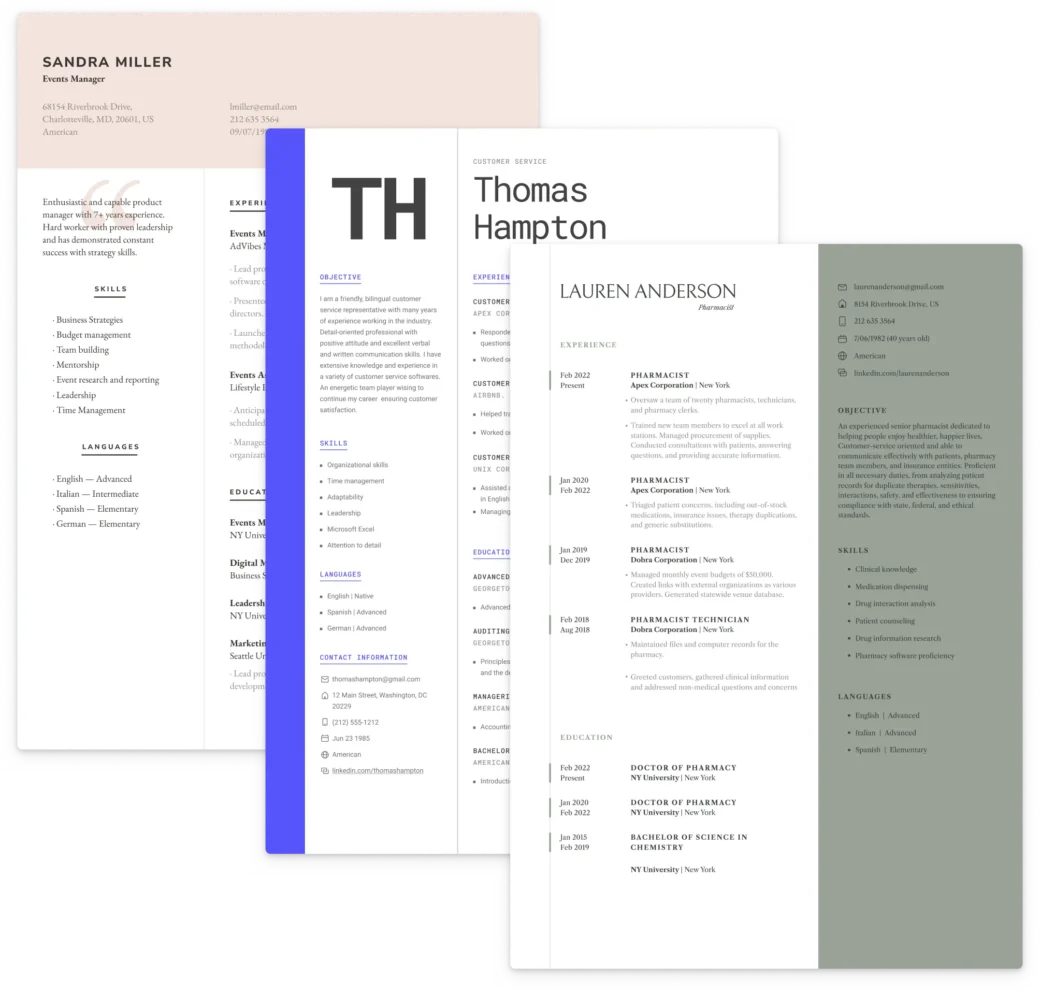Job loss can be a difficult and stressful situation for anyone to deal with. Whether you were laid off or fired, it can leave you feeling uncertain about your future and anxious about how to move forward.
In this article, we will:
- Explore the differences between being laid off and being fired
- Provide tips and steps to help you handle the situation and search for a new job with confidence.
Laid Off vs. Fired: What’s the Difference?
Layoffs and firings are two different types of job loss, and it’s important to understand the distinctions between them.
- A layoff is typically the result of a company restructuring, downsizing, or budget cuts, and is usually not the fault of the employee. In late 2022 and early 2023 we saw this in the news with the tech sector undergoing layoffs.
- In contrast, being fired typically occurs due to performance issues or behavioral problems on the part of the employee.
It’s important to understand that, if you were laid off, it’s not necessarily a reflection of your personal worth or abilities. Avoid taking the situation personally and focus on moving forward in a positive direction.
If you were fired, maybe you need to reflect on what led to that step being taken, and see how you can grow and learn from it.
The loss of a job can be a jarring experience that shakes your confidence. Moreover it can create a sense of uncertainty about your professional future. However, remember that a layoff is not a reflection of your skills or value as an employee.
Many companies undergo layoffs due to various reasons, including financial difficulties or a shift in business priorities. Understanding this can help you approach your job search with a positive attitude and the right mindset.
For instance, you could move your skills into a different sector. While some industries like the Tech sector undergo layoffs others, like Leisure and Hospitality, rose by 128,000 in January 2023 according to the Bureau of Labor Statistics.
Tips on How to Handle the Situation
If you’re wondering how to find a job after being fired or laid off, there are a few specific steps you can take to improve your chances of success.
Firstly, it is important to try and stay positive and focused on your goals, even in the face of setbacks and obstacles. It’s normal to feel a range of emotions, including shock, anger, and sadness.
How to cope with losing your job
- Allow yourself to feel your emotions: It’s okay to be upset or angry, and it’s important to allow yourself to process those emotions in a healthy way.
- Take care of yourself: Make sure to get enough sleep, eat well, and exercise regularly to help reduce stress and anxiety.
- Stay positive and focused: Job hunting can be a long and challenging process, and it’s easy to become discouraged along the way. However, try to stay positive and focused on your end goal. Keep in mind that finding the right job can take time. It’s not uncommon to face rejection along the way.
- Be patient and persistent: Since finding a new job might not happen right away, it’s critical to be persistent and keep applying even if you don’t hear back immediately.
- Stay motivated: To help stay motivated, try setting small, achievable goals for yourself. To give an example, make it a goal to apply to a certain number of jobs each week or try to attend a set number of networking events. Celebrate your successes, no matter how small, and don’t be too hard on yourself when things don’t go as planned.
Steps to Take in Your Job Search after a Layoff or Being Fired
Once you’ve processed your emotions and taken care of yourself, it’s time to start looking for a new job. Here are a few steps to help you get started:
1. Update your resume and cover letter
Make sure your resume and cover letter are up-to-date and emphasize your relevant skills and experience. Educate yourself on how to write and format your resume to better suit the job you’re aiming for. Then you are ready to start browsing the job sites.
Remember and then include all the relevant positive achievements you have had throughout your educational and working years, from consistent Dean’s List nominations through to being rewarded employee of the month.
To make your job search more efficient, leverage an online resume creator. One of these can help you create a professional-looking resume that highlights your skills and experience.
Our free online resume builder guides you through the whole process and provides tips and sample sentences along the way.

Build your perfect resume with ease
Craft the perfect resume effortlessly with our builder. Get started today!
2. Use job search websites
Utilizing job searching websites can be a powerful tool in finding new job opportunities.
There are numerous websites and platforms available that can help you in your job search after losing your job. Indeed, Glassdoor, LinkedIn Jobs, and Monster are just a few examples.
How to leverage job platforms effectively
- Create a detailed and targeted profile that highlights your relevant skills and experience. This will help you appear in relevant job searches and can increase your chances of being contacted by potential employers.
- Make use of the site’s search filters to narrow down your job search to specific industries, locations, and positions that align with your career goals. If available, set up alerts for new job postings that match your criteria.
- Be mindful of your online presence. Ensure that your social media profiles are up-to-date and professional. This is because many employers may review them as part of their hiring process.
- Reach out to potential employers and follow up on job applications. Utilize the messaging or networking features to connect with hiring managers or other professionals in your desired industry.
3. Network with others
When networking, it’s important to be authentic and genuine in your interactions. Focus on building meaningful relationships with others and providing value to them, rather than just asking for job leads or recommendations.
Offer your expertise, share your insights, and provide assistance whenever possible.
Here are a couple of actions you can take for effective networking:
- Reach out to your existing network of colleagues, former coworkers, and industry contacts. Let them know that you are actively seeking new job opportunities and ask if they have any leads or recommendations.
- Attend industry events, conferences, and job fairs to meet new people and expand your network. Be proactive in introducing yourself, sharing your professional background, and exchanging contact information.
4. Explore new opportunities to develop your skills
During your job search, it can be beneficial to explore new skill development opportunities to enhance your qualifications and increase your marketability.
Some ideas on how to grow your skill set:
- Assess your existing skills: Take an inventory of the skills you already possess. Identify areas where you can improve and invest time and effort into developing those skills.
- Consider online courses, certifications and attending workshops and seminars: Many online classes and certifications are available for free or at a low cost, and can be completed at your own pace. When looking for events, focus on your industry or in areas where you want to develop new skills.
- Volunteer: Volunteering for a cause relevant to your work sector can provide opportunities to develop new skills, gain valuable experience, and expand your professional network.
- Do an Internship: It might feel like a step backward, but it’s never a bad thing to intern or work-shadow if you are looking to pivot your career in a new direction.
- Seek out a mentor: Look for someone who has experience in your industry and is willing to share their knowledge and expertise with you.
5. Build your online presence
In today’s digital age, having a strong online presence can be crucial to standing out in the job market.
Aside from updating your LinkedIn profile to reflect your skills and experience, you should engage with industry thought leaders and peers to expand your network.
By being strategic and intentional in your use of platforms like Twitter, Instagram, or TikTok, you can ensure that you present a positive, professional image to potential employers. Here are some actionable pointers:
- Use relevant hashtags: Research industry-specific keyword hashtags and include them in your posts to attract the attention of potential employers.
- Share trade-pertinent content: Share relevant articles, news, and trends in your industry to demonstrate your expertise and knowledge.
- Engage with industry professionals: Engage with these professionals by commenting on their posts and participating in trade discussions. This can help you build your network and establish yourself as a thought leader in your field.
How to Explain the Situation to New Employers
When it comes to explaining your job loss in an interview or on your resume, it’s important to be honest and transparent while also emphasizing your skills and experience.
When discussing your previous job loss, be truthful yet concise. Avoid speaking negatively about your previous employer or co-workers. Focus on what you learned from the experience and how you’ve grown from it.
Here are a few tips to help you explain the loss of employment:
- Be honest: Describe the situation in a clear and concise manner, and avoid blaming others or making excuses.
- Emphasize your skills and experience: Highlight your relevant skills and experience to show potential employers what you can bring to the table.
- Detail what you learned: Use the experience as an opportunity to show what you learned and how you’ve grown as a professional.
- Practice your explanation: Practice explaining the situation in a calm and confident manner before your interview to help reduce anxiety.
Key Takeaways
Finally, remember that finding a job after being fired or laid off can take time. It’s important to be patient and not give up on your job search. Keep applying to jobs and attending networking events, and don’t be afraid to reach out to your contacts for help and advice.
At the same time, make sure you take care of yourself during this time. Job searching can be stressful, so make sure to prioritize self-care and take breaks when needed.
Getting a new job after a layoff can be a challenging experience, but with the right mindset and approach, it can also be a time of growth and opportunity.
By reassessing your career goals, utilizing your professional network, researching companies of interest, and exploring job listings and resources, you can find new professional opportunities that match your skills and experience.
We hope that this guide has provided you with valuable insights and resources to help you navigate your job search journey.
Remember that job loss does not define your worth. Keep applying and networking, and stay positive and confident in your abilities. The perfect job opportunity may be just around the corner!
Related Posts
